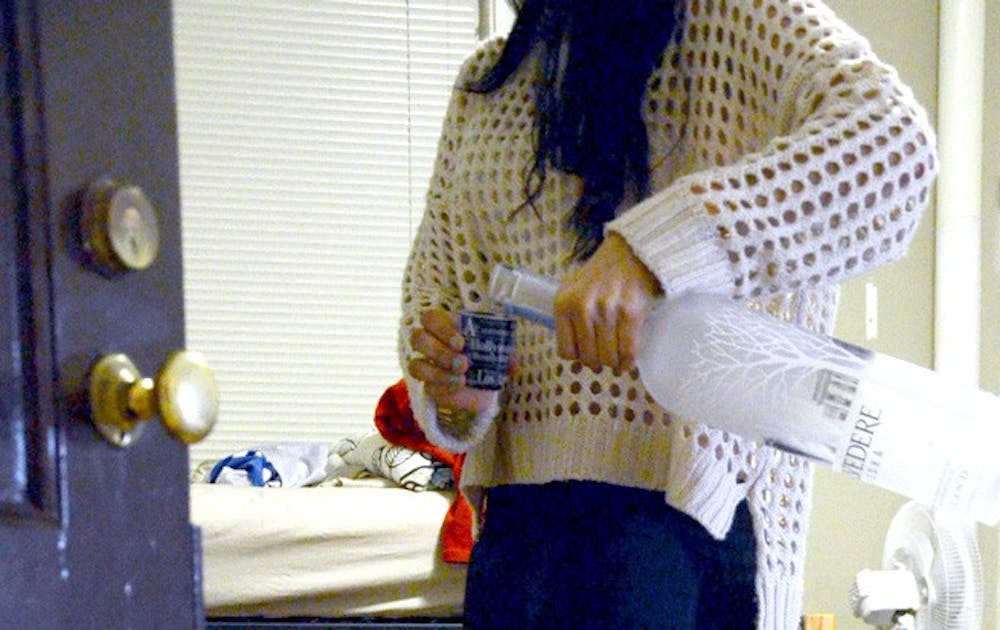At some schools, students can drink with their doors open.
This is not allowed at Duke, where administrators’ priorities remain focused on abiding by state and federal law, but some students are looking to increase openness within the alcohol policies. Peer institutions take different approaches, such as Stanford University’s policy tolerating responsible alcohol consumption in dorm rooms that are open to residential staff. These approaches, however, are not necessarily transferable to Duke’s social scene.
The legal drinking age shapes much of Duke’s undergraduate alcohol policy, Vice President for Student Affairs Larry Moneta wrote in an email Monday.
“Ultimately, we can have no law that openly permits drinking by anyone under 21,” Moneta wrote. “That’s simply the law and one that we can’t ignore.”
Moneta explained that Duke’s approach spans a comprehensive mix of policies, education and enforcement. The policy encourages students to avoid unsafe situations and take accountability for mistakes made. He said that although the policy attempts to abide by the law, it also intends to respect the personal decisions students make regarding alcohol.
Under the Duke alcohol policy, students under 21 are not permitted to purchase, possess or consume alcoholic beverages under any circumstances. Violations are grouped into four categories—underage possession and consumption, unsafe or irresponsible behavior, violation of community expectations and a general provisions violation. Driving while intoxicated, for instance, is considered a community expectations violation—in the same category as littering and vomiting in public while drunk.
Other peer institutions place the emphasis specifically on preventing dangerous behavior. According to its alcohol policy, Washington University in St. Louis “places its highest enforcement priority on enforcing violations that are repeated, disruptive, dangerous, and/or flagrant” rather than emphasizing all consumption by students younger than 21.
Stanford University operates under what is known by students as an “open-door policy.” This stipulates that students will not face disciplinary action for drinking in their rooms with their doors open, so that the residential staff will be able to interact with residents when needed for safety reasons.
“We are concerned with the disruption that occurs with alcohol abuse,” said Ralph Castro, associate dean of student affairs and director of the Office of Alcohol Policy and Education at Stanford. “We treat them as adults and have higher expectations for their behavior. [If a violation occurs] and poor choices are made, we intervene quickly.”
Castro said that if students do violate the policy in unsafe ways, they must complete an alcohol education program. Additionally, no organized parties are permitted during the “End of the Quarter Period” or finals week, and students are prohibited from making alcohol available to new students during the orientation period. Certain areas of Stanford’s campus, such as freshman common rooms and the White Plaza, are also alcohol-free.
Castro noted that while minor violations are treated with an educational approach, egregious errors such as driving while intoxicated lead to a judicial hearing and often suspension from the university. This approach is reflected in academic matters too: although midterms and finals are often administered without professors or teaching assistants in the room under faith that the students will not cheat, those who do cheat will be suspended.
“We give them a lot of freedom on the front end but swift and severe consequences on the back end,” Castro said.
This strategy resembles ideas proposed by the Amethyst Initiative, a coalition of 136 university presidents who signed a statement asserting that the drinking age at 21 “is not working” and calling for new discussion of the drinking age and how to prepare youth to approach alcohol responsibly. President Richard Brodhead signed the initiative in 2008.
Duke’s drinking culture would not be immediately compatible with an open-door policy like Stanford’s were it to be implemented, said junior Stefani Jones, Duke Student Government vice president for equity and outreach and DSG president-elect. Jones noted that the regulation of drinking culture at Duke is very different from the approach at Stanford.
“Trying to decrease the amount of drinking on campus pushes it off campus to places more unsafe,” Jones said. “We should promote a healthy and safe drinking culture rather than push it underground. [But] looking at a policy like that, it would only work here if you change what Duke defines as ‘responsible drinking.’”
Jones noted that DSG has been considering implementation of changes to the alcohol policy throughout the year. However, she noted that a policy mimicking Stanford’s would not be automatically successful.
“I don’t think the right approach is to say that if it works for Stanford, it will work here,” Jones said.
Get The Chronicle straight to your inbox
Signup for our weekly newsletter. Cancel at any time.

